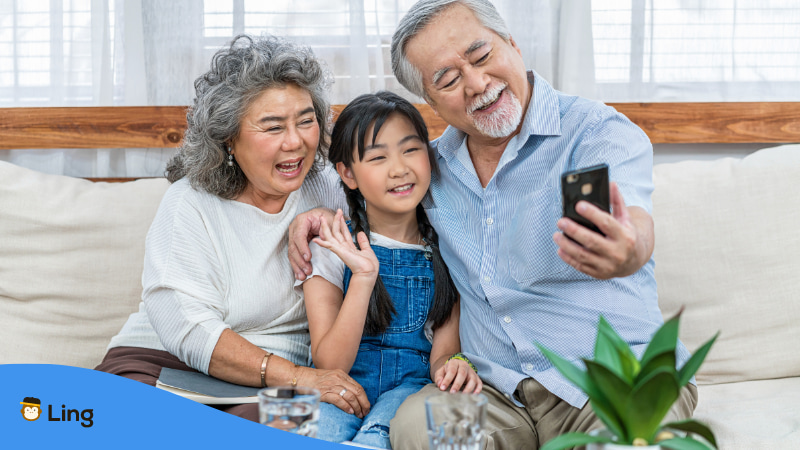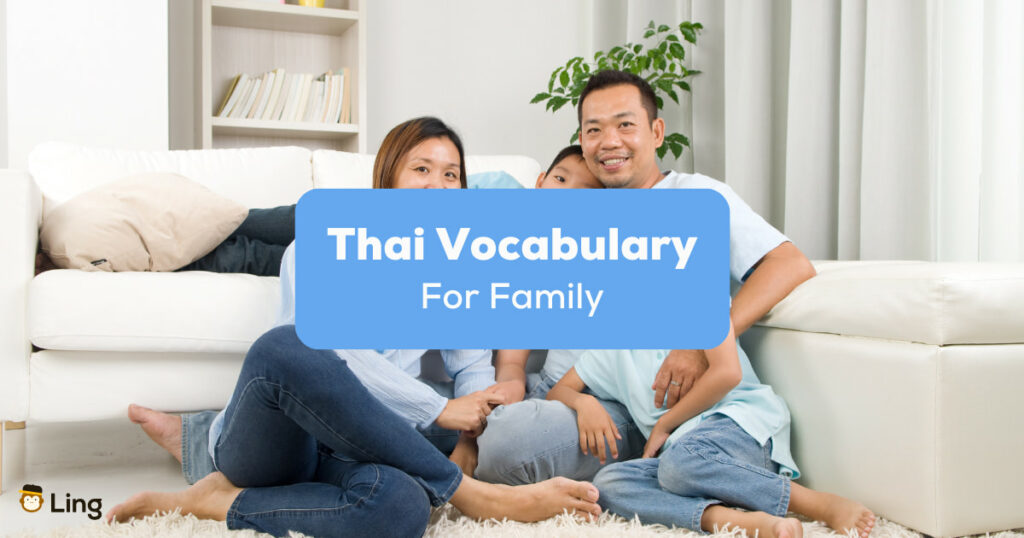Curious about Thai vocabulary for family? In Thailand, it is not unusual for extended families to all live together in one house. They say that, if you marry a Thai, you also marry their whole family. While this might seem strange for some, it actually works out quite well. When parents need to go to work, they can leave their children with their grandparents, so there is no need for a babysitter. There is always someone on hand to take care of chores, make the food, and everything like that. No one would get lonely, that is for sure.
I thought that today we could look at some vocabulary relating to family or ครอบครัว (khrawp krua) as it is known in Thai. Think of it as an extension of introducing yourself – family values are strong in Thailand, so people are likely to ask about them. Prepare yourself with this Thai vocabulary for family.

Thai Vocabulary For Family That You Need To Know
Oh, if you want to chat with locals about family in Thai, it’s important to know all the basic words related to family. Sure, let’s dive right in!
How To Say Mother And Father In Thai?
Let’s start off by talking about parents. They are the head of the household, and their children are expected to take care of them as they get old. It is not uncommon for those who move out of their village to the cities to send money to their parents every month. The point is that there is a lot of respect for parents in Thai culture.
When addressing parents, you can use the word แม่ (mae) for mother/mom, and the word พ่อ (phaw) for father/dad.
| English | Thai | Pronunciation | Sound |
|---|---|---|---|
| Parent | พ่อแม่ | Pɔ̂ɔ mɛ̂ɛ | |
| Father | พ่อ | Pɔ̂ɔ | |
| Mother | แม่ | Mɛ̂ɛ | |
| Father (formal) | บิดา | Bì daa | |
| Mother (formal) | มารดา | Maan daa | |
| Stepfather | พ่อเลี้ยง | Pɔ̂ɔ líang | |
| Stepmother | แม่เลี้ยง | Mɛ̂ɛ líang |
Are you married to someone from Thailand? Then, you should also know the words for addressing the in-laws, especially as you will be spending a lot of time with them. There are different names given based on whether they are the parents of the husband or the wife.
Father-in-law on the wife’s side is referred to as พ่อภรรยา (phaw pan ra yaa). Mother-in-law on the wife’s side would be แม่ภรรยา (mae pan ra yaa). Then on the husband’s side of the family, there is the father-in-law พ่อสามี (phaw saa mii) and the mother-in-law แม่สามี (mae saa mii).
For those interested, these would literally translate as ‘father wife’ and ‘mother wife’ etc., where สามี (saa mii) means husband and ภรรยา (pan ra yaa) means wife. That works out well, as there are fewer words to learn overall.
Did you notice that there are some casual ways to refer to your father-in-law and mother-in-law, like “พ่อปู่ (pɔ̂ɔ bpùu)” and “แม่ยาย (mɛ̂ɛ yaai)?” So it’s like a combination of the words mother/father and grandparent. This means that the person is both your partner’s parent and your child’s grandparent. It’s simple, isn’t it?

What Is Thai For Grandparents?
The grandparents, as elders, should also be spoken to with respect in the culture of the country. They are ultimately your parents’ parents, after all. Again, we have different words depending on whether the grandparents are paternal (on the father’s side) or maternal (on the mother’s side).
Starting with the father’s side, we have the Thai word for grandma, which is ย่า (yaa). Grandpa in Thai is ‘bpuu’ (ปู่). On the mother’s side, you would use ยาย (yaai) and ตา (dtaa) for grandma and grandpa, respectively.
What Is The Word For Siblings In Thai?
Now is the time to take a look at brothers and sisters. In this case, the Thai language differentiates between younger and older siblings, unfortunately, means more words to learn. As a way to denote the age of siblings, the terms พี่ (pii), meaning elder, and น้อง (noong), meaning younger, are used.
So older brother in Thai is พี่ชาย (pii chaai) and younger brother is น้องชาย (noong chaai). Older sister is พี่สาว (pii saao) and younger sister is น้องสาว (noong saao).
What Are The Words For Your Children And The Children Of Family Members?
The terms for son and daughter also use similar words. For example, son is ลูกชาย (luuk chaai) and daughter is ลูกสาว (luuk saao). For grandson or granddaughter, just put หลาน (laan) before the word for son and daughter.
Other Words For Family Members
Finally, let’s take a look at the Thai words for your parents’ siblings and how to refer to those in-laws.
Tips: How To Refer To A Family Member By Name
Respect for elders is essential to Thai culture. You should always use the person’s seniority designation along with their name when addressing someone older than you. One of the most prevalent words is “พี่ (pîi),” which can be used with both male and female elders in your life, such as relatives and coworkers.
Like I said above, you can use “พี่ (pîi),” interchangeably with “พี่สาว (pîi sǎao)” and “พี่ชาย (pîi chaai)” without having to specify the gender of the person. The same rule applies to addressing relatives of one’s parents. Let’s check it out.
| Formula | English | Thai | Pronunciation | Sound |
|---|---|---|---|---|
| Word + person name | Uncle + Tim | ลุง ทิม | Lung tim | |
| Word + person name | Aunt + Ann | น้า แอน | Náa ann |
Practice Thai Vocabulary For Family
Hopefully, now you know how to address your mother, father, grandparents, and siblings in Thai. You can use this knowledge when talking with them or talking about them with others which is perfect for making new friends or, in the case of a relationship, talking to your partner’s family. Whatever the reason, it is always a good idea to expand your vocabulary with new words and phrases and keep testing yourself with the Thai language.
You can also try practicing Thai vocabulary for family with your friends. Don’t wait to go to Thailand just to practice these words. And what’s the best way to learn Thai? By using a language learning app!
Learn More Thai With The Ling App
Another great way you can test your Thai language skills is with the Ling app. Boost your ability to read, write, and speak by using the app for just a few minutes every day. The Ling app has 200+ lessons that you can practice your Thai skills as long as you like. You can even browse the other 60+ languages while not losing your progress!
Practice speaking Thai by downloading the Ling app on the App Store or Play Store now!
Updated content by Mei





































































4 Responses
I watched F4 Thailand and i noticed Glakao called Gorya not Phii but “Che” ( I don’t know if i write it correctly). Why is that so?
Hi Katya!
It must be “เจ้ (jê) or เจ๊ (jé),” which is used to mention an older sister in Thai-Chinese families. So it’s a Chinese borrowed word. Chinese Mandarin is 姐姐 (jiějiě), while most Thais pronounce it more closely to Chinese Teochew, which is “zê.”
By the way, Thai people also use this word to casually call women older than them if they’re close to each other; it’s unnecessary to be in a Chinese environment.
I’ve heard in some dramas of other ways they call their brothers or sisters. I just don’t know if I heard it right, like Hiya? Hya? Something like that. The subtitles didn’t really translate correctly so I am not sure.
Hello Jinji!
If the word เฮีย (hia) is used to call someone in the family, it means “older brother.” It’s a borrowed Chinese word from “兄 (xiōng), Chinese-Taochew language. There are so many Thai-Chinese families in Thailand, so it’s common to hear people call their family members a Chinese word.
Plus, Thais sometimes use the word เฮีย (hia) with male friends at school or the workplace if they’re older than you; with unnecessary to be in a Chinese environment.